Filters
Product Categories
Fishermen and coastal communities are increasingly experiencing shifts in fish resource abundance and distribution, likely related to changing ocean temperatures caused by climate change.
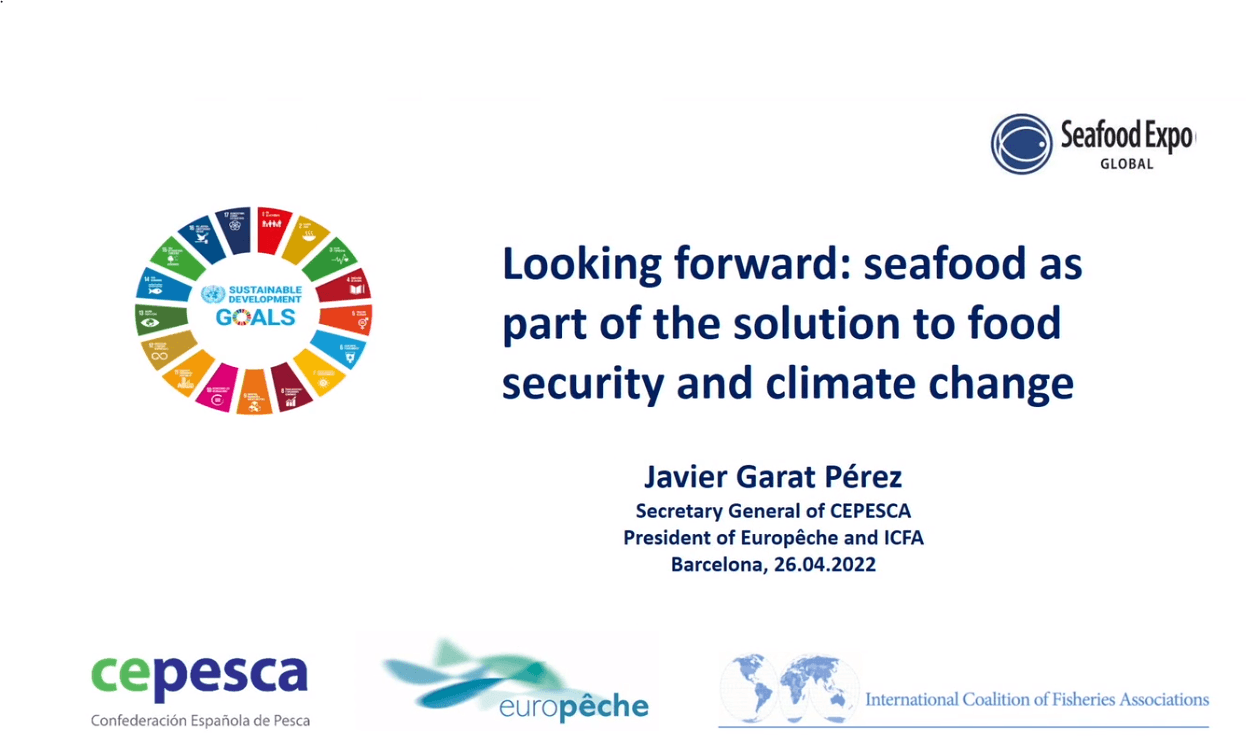
Speaker: Javier Garat, President - Europêche and ICFA
FAO talks about the new narrative concerning the fishing industry. In the conference, Javier Garat will talk about the reasons why seafood is the healthiest animal protein in the planet and with less carbon footprint in its production. He will explain why it is so important to contribute to world food security and to the fight against climate change. Garat will talk about the need to manage 100 % of the world fish stocks and the need to balance the conservation of marine biodiversity, the sustainable use of the natural resources and the food security. Furthermore, he will talk about the contribution of fishing industry to the SDG and how innovation is contributing to the sustainability of the industry.

What's Happening with US Aquaculture Industry Advocacy
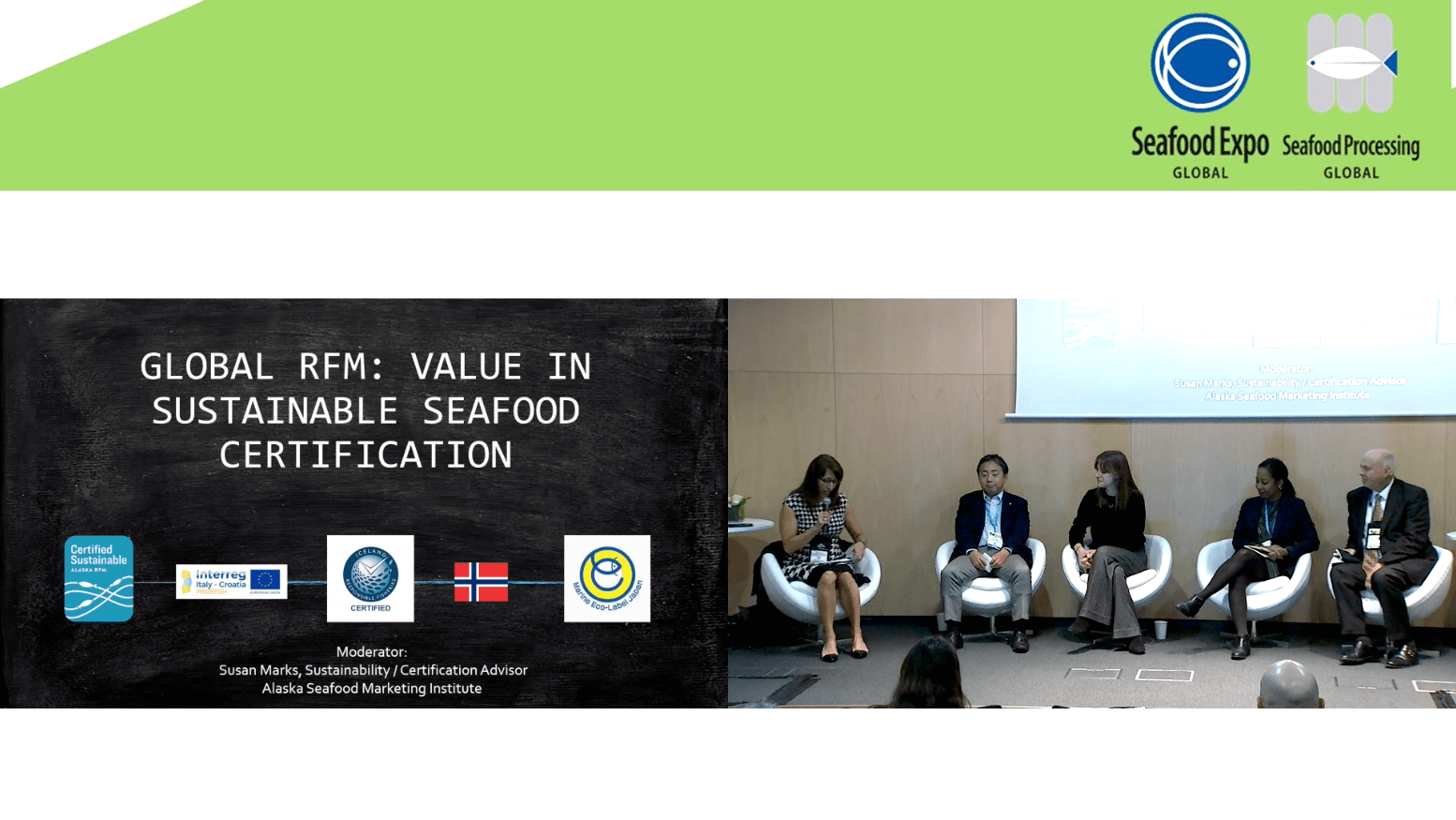
Speaker: Howard Tang, CEO - Peritus Capital
Environmental, Social, Governance (ESG) investing has become a multi-billion-dollar behemoth for Wall Street and beyond. What was once a niche investment class can only be ignored by corporate titans, venture capitalists, and family offices at their peril. Sustainability-focus has become an investment commandment. The aquaculture industry has not been immune. The sector has been facing ever more scrutiny on a range of issues regarding poor fish welfare, the use of unsustainable raw materials, and its overall environmental impact. Investor pressure has pushed the industry towards more transparency and overall accountability with nearly every major aquaculture company publishing ESG metrics. Meanwhile, global aquaculture companies are taking environmental stewardship seriously by taking vocal stands against Amazon-sourced soy and by investing heavily in fish meal alternatives. Billions of dollars have also been poured into land-based initiatives like Atlantic Sapphire and Kingfish Zeeland, despite their complexity and frequent setbacks. It’s a tangible demonstration that investors are willing to endure challenges and volatility to see the promise of a locally produced fish that is more sustainable come to market. It’s easy to go down the rabbit hole in terms of ESG and sustainability for both investors and companies. This session will explore the most critical issues facing aquaculture today and what future issues are on the horizon. We’ll discuss how sustainability is pushing the industry to innovate and is challenging conventional shorter-term investment horizons from new production methods such as land-based farming and off-shoring to alternative feed ingredients for fish meal and soy.

The Evolving U.S. View of the Asian Seafood Market
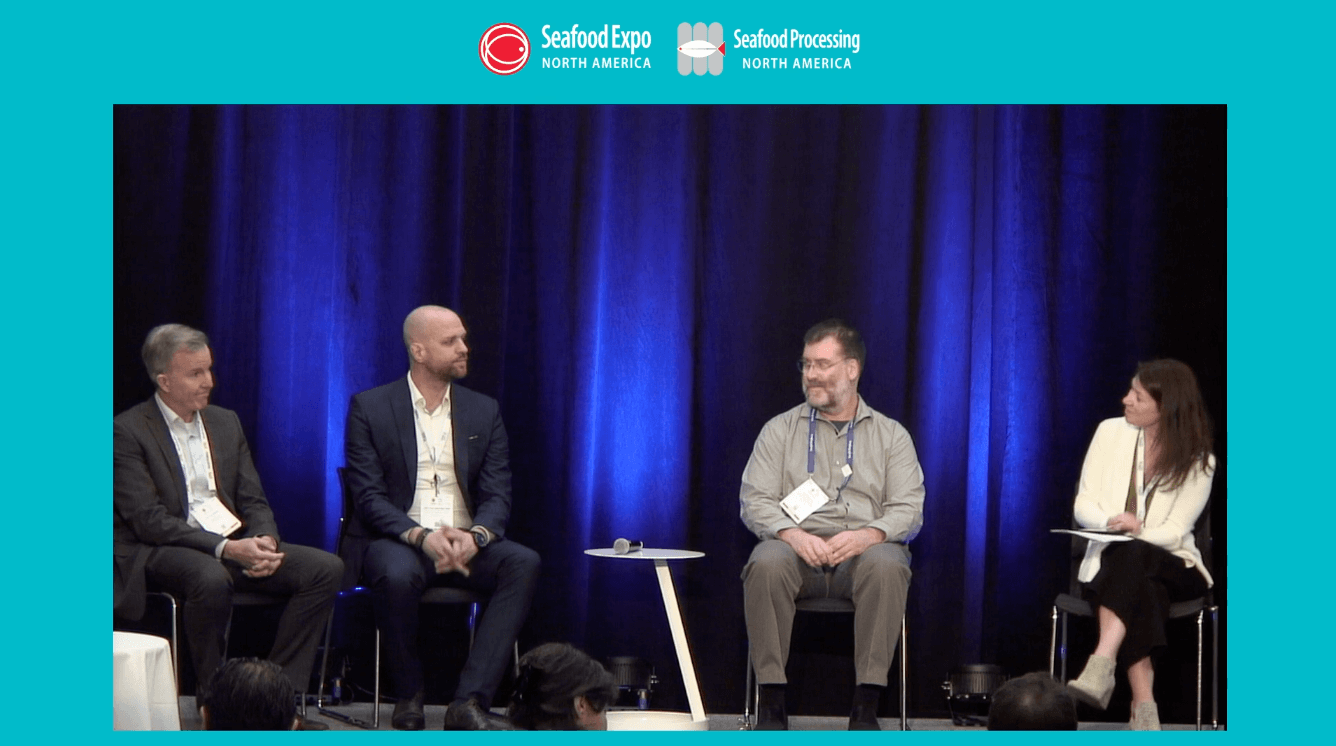
Moderator: Jill Swasey, ASC
Speakers:
- Anton Immink, ThinkAqua
- Dave Martin, Sustainable Fisheries Partnership,
- Roy Van Daatselaar Aquaculture Stewardship Council (ASC)
Fishery Improvement Projects (FIPs) have become an instrumental tool for fisheries sustainability over the past decade. While improvements in aquaculture are just as critical as in fisheries, Aquaculture Improvement Projects (AIPs) are far less developed than their FIP cousins and have yet to gain traction in the marketplace. At the same time, awareness is growing on the historic and current environmental impacts of aquaculture production, particularly on critical habitats such as mangroves. As aquaculture production increases globally, opportunities exist to both scale-up responsible production while also preserving the biodiversity and climate benefits gained through restoring critical habitats. Three of the leading organizations in responsible aquaculture – the Aquaculture Stewardship Council, Sustainable Fisheries Partnership, and Monterey Bay Aquarium Seafood Watch – are teaming up in an effort to streamline the path to sustainability for aquaculture producers, engaging more stakeholders in the process, and delivering improvements in farming practices and management that will protect those essential functions gained through restoring critical habitats. Farmers engaged in improvement program pilots are supported through partnerships with local consultants and supply chain partners. These pilots provide farmer support and capacity building at a greater scale by engaging farmers that have common practices and challenges in a shared region. In some instances, barriers to information requirements can be alleviated through the use of remote monitoring technology and shared impact assessment studies. This allows project partner organizations the opportunity to reduce the burdens and confusion of information needs to farmers and cater trainings and improvements to the farmer needs and at the scales at which they operate.
Together, these organizations will convene a diverse group of industry and other stakeholders to:
• Discuss the importance of aquaculture improvement in relation to assured supply of sustainable seafood;
• Explore how landscape level improvements can facilitate farm-level certification (and vice versa);
• Highlight opportunities to protect and restore critical habitats and maintain responsible farming practices; and
• Share some early lessons learned and opportunities for engagement in pilot aquaculture improvement projects underway.
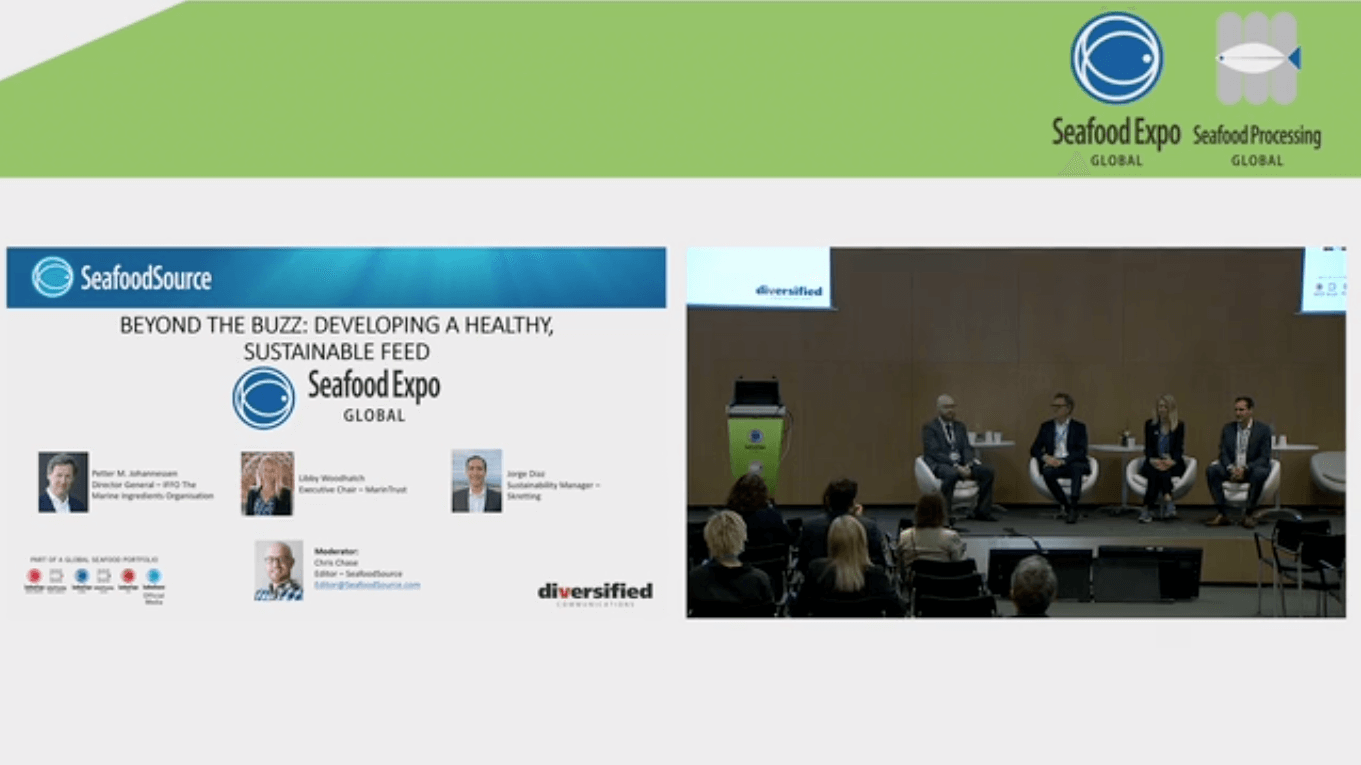
Speakers: Chris Chase, Editor - SeafoodSource.com, Jorge Diaz, Sustainability Manager - Skretting, Petter Martin Johannessen, Director General - IFFO The Marine Ingredients Organisation, Libby Woodhatch, Executive Chair - MarinTrust
The aquaculture feed sector is seeing the development of new inputs with the potential to improve the sustainability of its product. While these new innovations can contribute to a better feed, traditional inputs like fishmeal still hold the greatest potential to efficiently deliver a nutrient rich, sustainable feed to the aquaculture marketplace. This panel will explore how the feed sector is working to design a feed that meets the needs of the aquaculture industry and its customers.

There is increased awareness about the need to change the way we farm and harvest fish. A more efficient production and transparent value chain will be important factors in establishing future sustainable growth for the industry.
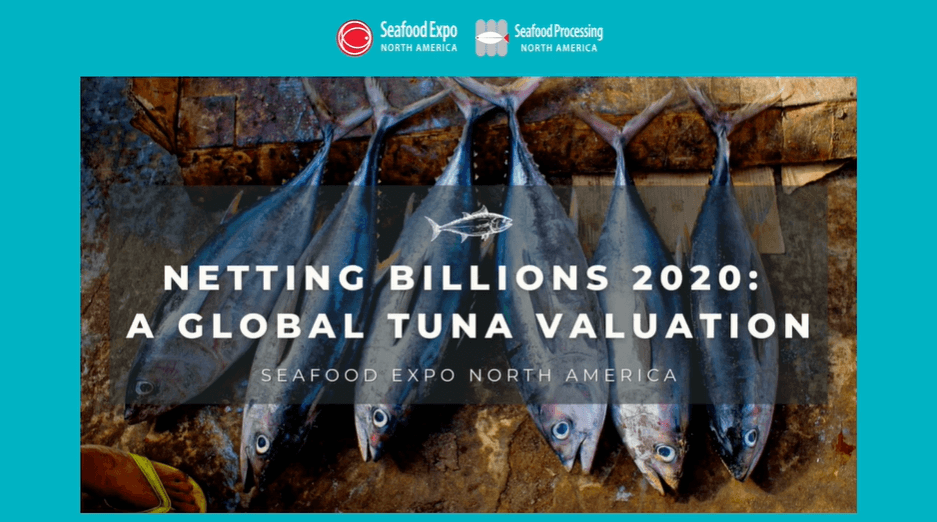
Moderator: Grantly Galland, The Pew Charitable Trusts
Speakers: Hugo Byrnes, Ahold Delhaize
Greg Hammann, Marine Instruments
Raiana McKinney, The Pew Charitable Trusts,
Tom Pickerell, Global Tuna Alliance
In 2018, commercial tuna fishing was worth more than US$40 billion to the world economy, more than the GDP of at least 100 nations. From canned tuna to top-shelf bluefin sashimi, these fisheries generate significant revenue and support an enormous industry from the fishers all the way to the consumers. Due to the ongoing global pandemic, demand for non-perishable protein sources, such as canned tuna, has skyrocketed. It is easy to see just how vital the tuna industry is for not just the blue economy—but for food security around the world.
But while vessels are catching more tuna than ever before to meet this demand, the value at the dock and at the final point of sale has decreased since 2012. When factoring in the costs associated with higher catch, profits may have even declined substantially. The message is clear: catching more fish is not always better for the bottom-line. Sustainably managing tuna fisheries and allowing overfished stocks to recover will maximize their value, reduce the cost of fishing, and sustain marine ecosystems and the industries and people who rely on tuna fishing. Better management of tuna fisheries is not simply a conservation issue but also an economic one.
Yet, more often than not, the long-term sustainability of these fisheries takes a back seat to the short-term political or monetary gains that often drive management decisions. Adopting forward thinking harvest strategies, coupled with stronger consequences for noncompliance and well-developed electronic monitoring of fishing activity would all help restore tunas to healthy population sizes, preserve their value, and ensure that these valuable fisheries are being governed effectively.
This session would start with an overview presentation on recent research to estimate the global monetary value of commercial tuna fisheries. Beyond the economics, the presentation will cover the tuna fisheries management process and discuss ways governments and industry can improve management of fish stocks globally by:
1. Modernizing management through harvest strategies,
2. Improving oversight and accurate reporting of fishing activities, and
3. Ensuring consequences for noncompliance with fisheries rules.
Following this presentation, the Global Tuna Alliance will moderate a panel discussion.

What the New Executive Order on Seafood Means for Expanding Sustainable U.S. Seafood Production





